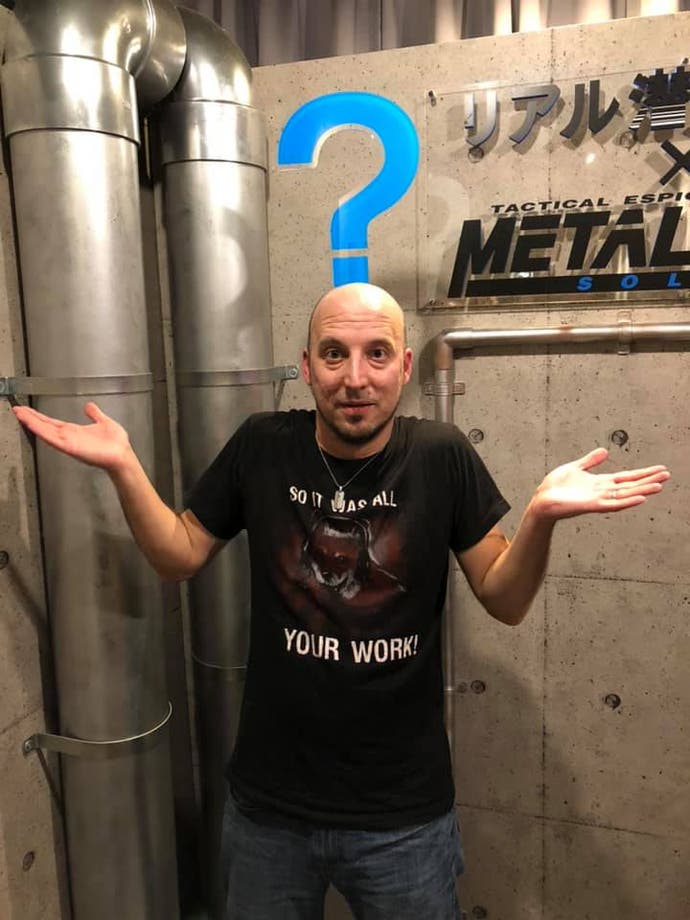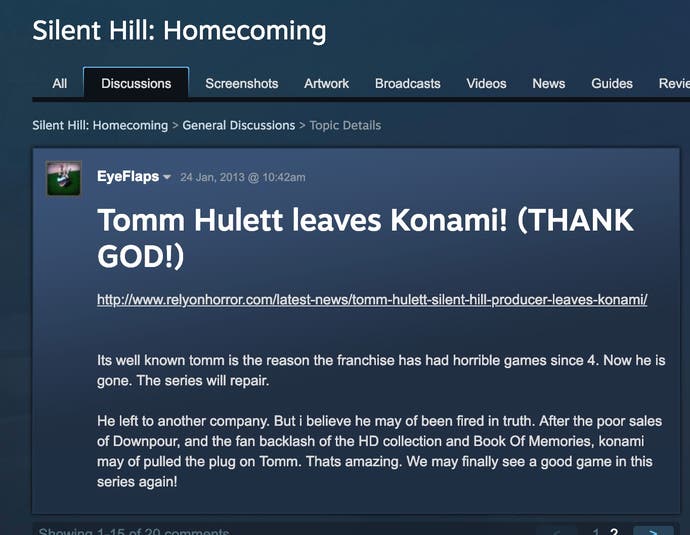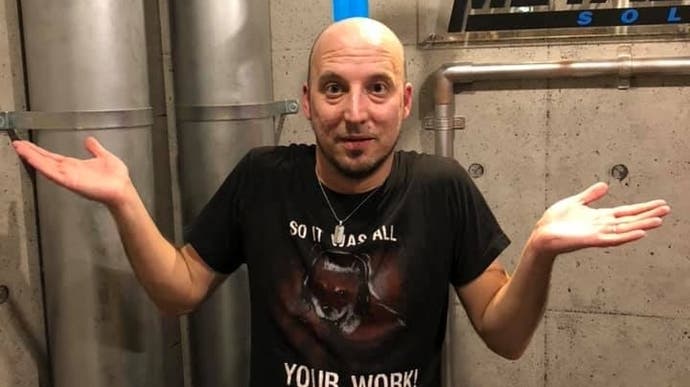Life after harassment: ex-Silent Hill dev Tomm Hulett speaks out
"I have that paranoia now."
"What bothers me about it most is that when people attribute the 'F#ck Konami' hashtag, they're thinking of me. I know that some people are typing it like, yeah, Tomm Hulett sucks!"

I didn't expect Hulett to be this brutally honest. I can't decide if it's due to the years of being dogged by the same old shit or simply the realisation that that shit is going to stick no matter what, but he's reflective and honest without any semblance of polish or sugar-coating. There's no spin, but there's also no self-pity, either, as he recounts how his development career has fared under not just the weight of an angry fandom, but also the scrutiny of his peers, too.
In the spirit of full disclosure, I was - and still am - part of that fandom. I was eleventy gazillion months pregnant and bored stiff on forced bedrest when my pal, Dave, asked if I fancied running a Silent Hill site with him. I'd already spent a lot of time thinking, and writing, about Silent Hill; its stories, its mythos, its desperate melancholy. Writing about Silent Hill led me to this very website. And some of the grossly unkind things written about Hulett are probably still buried on the very servers I still run today.
Hulett popped up in the fandom sometime around the spectacularly not-good Homecoming ("I didn't want to be seen as the Homecoming guy - I'd spent the last two and a half years trying to fix it to no avail"), but it was with Shattered Memories - the series' only foray into motion-control on Nintendo Wii - that his name became synonymous with the series... sadly, for all the wrong reasons.
"[Producer] Devin [Shatsky] was running Downpour while I finished Shattered Memories," Hulett says, reflecting on when he first realised he was carrying the weight - and blame - of the entire series. "There'd be interviews [on forums] and you'd see in the question threads, people would be like: 'ask him why he sucks','ask him why he hates Silent Hill'."
The franchise arguably lost its way when Konami shifted development from its internal teams - dubbed "Team Silent" - although, in truth, there was never one singular team that worked across titles - to external studios after the fourth instalment. After that, Konami cycled through a stream of Western developers - Climax, Double Helix, Vatra - and for most of those successors - Origins, Homecoming, Shattered Memories, Downpour, and Book of Memories - critical and fan reception was, on the whole, not good.
"I felt like I had a target on me but I'd be told stop worrying about the fans - don't worry, they'll buy it anyway -" I gasp a pretty unprofessional gasp at this point, "- they'll buy anything that says Silent Hill on it, so it's not a problem. I already knew [...] I was targeted for it and I was seen as The Guy on this. Devin had done an interview where he said that he didn't like the Silent Hill one cult stuff, which... you know, you're allowed not to like the Silent Hill one cult stuff, but someone had attributed that to me on a message board: 'Tomm Hulett hates Silent Hill one!" I was like: alright. Not true, but okay.
"But when I saw [a fan-made web-series slating Hulett's contribution to the franchise], I got a really sick feeling - tons of people are going to see this. And it's taking what I already felt bad about and broadcasting it. It's going to be bad.
"And then it was."
Then came the dreadful - and dreadfully broken - Silent Hill HD Collection.
Before the days of community management, Hulett - "as a fan my whole life, I love reading the interviews with the actual people making the games" - was all too willing to talk to press and fans. He'd signed up at my own forum and happily (at least initially) engaged with fans there. Then a small but rabid portion of the fandom fixated on Hulett as the source of all that was wrong with their beloved franchise... and they were desperate to make their disdain heard.
Interestingly, though, Hulett's colleagues and bosses were seemingly unbothered by this growing swell of a handful of angry, if vocal, fans.
"Konami didn't officially do anything to help or support me, but I also didn't ever feel at risk of being fired because of the blowback," he says. "Other people hadn't really been harassed and fired - or not yet, in the industry. Maybe if this was happening a couple years later, I would have been worried [...] We could get all the hate mail but that didn't become 'Hey Tomm, we hear that you're ruining Silent Hill and you better stop'. That never happened. So, [Konami] didn't give me any additional support or safeguards or make any statements to support me, but they also didn't make me face consequences because fans had targeted me for ridiculous things."
To make matters worse, though, Hulett had to not just battle the views of players, but also that of his peers, too. While his colleagues at Konami knew the truth of what he was - and was not - responsible for, managing the message amongst his industry peers, not to mention potential employers, was not so easy. It's not something I'd ever thought about before, but now Hulett's said it, I can't unring that bell; his name is unique, and surely infamous to a small but hardcore number of gamers... gamers that might well now be developers.
"Since then, at other companies, I think it has affected people's view of me, because I'll hear comments from time to time of: Oh, my friend works at that company, and he hates you'. Or I've talked to various companies, and then had contact shut off. And then I always suspect like... Oh, someone there's a Silent Hill fan.
"Knowing that people in the industry are taking that at face value and are letting that reflect on what they see of me and my abilities is like, really? Do you understand this could be you? [Players] could just see your name on a thing that you worked on and turn on you. It's not factual. It's not based in things you actually did and things you actually impacted, because they don't know."
Hulett was hysterically blamed for a myriad of things - from losing the source code to changing voice actors to deciding to make Book of Memories a dungeon crawler - but in truth, Hulett's ability to influence such things was significantly less than fans realised. But because he too was a fan of the series, and because he, just like me - maybe just like you - had spent an inordinate amount of time poring over the story and symbolism, he cared about these games. And he cared about the community that loved them, too. But his willingness to talk about the games mid-development had come back to haunt him.
Worse still is the paranoia that Hulett's name may now unduly taint a project before it's even begun.
"Then we've had clients that have been meeting with us about things and someone will say 'Oh, well Tomm's tied to that project, blah blah blah', and then maybe that project goes away... I have that paranoia now. Is this because of Silent Hill? Maybe not. Maybe so. But it sucks to have to think that. And it super sucks if it's true.
"I was really worried about it working on Goosebumps just because that's a horror game," he adds, talking of WayForward's 2015 movie tie-in game. "It's a kid's property and there was lots of 'let's mitigate risk'. This is a licensed game based on a movie. It's got to come out on time. We don't want any waves. And I was like, oh man - if they Google my name, I might be a giant wave. I was paranoid that whole project. Thankfully, it never came up (to my knowledge), and I really love the game we made, so I hope people play it. But there's always that aspect of my career that I have to think about."

Sadly, Hulett's ongoing harassment - while he's "not getting daily death threats or anything", yes, he continues to get messages about Silent Hill six years after his departure - is not isolated. There are sustained campaigns, many seemingly organised specifically to target female devs and community staff. So, from his own experience, what can the industry - and studios themselves - do to protect their staff? And can boycotts really affect the fortunes of a title?
"I don't think [boycott campaigns] really affects sales," he says. "I don't think that's a big enough group. They're loud, but just as many people might hear about it and decide to support [a game and/or company]. It evens itself out. But companies - depending on who at the company hears it and what mood are they in - can react in a knee jerk way without researching it.
"We're in a weird time where people aren't going to do anything wrong but they're going to face consequences because someone at home who has never worked in the industry doesn't understand their day-to-day. It's so rough right now.
"There's not one guy making all the decisions on a video game. That's just not how they work. I get that there's a lot of factors that really put a target on me but internally, I was only the Silent Hill guy in the fact that I had played all the games, I already knew them as a fan, and I knew all the details and all the characters so no-one else had to research it because they could just ask me. In that way, I was the Silent Hill guy. Or the Silent Hill bible or whatever. Whichever quote people want to say that I said and use that against me."
Anyway. It's all moot now, right? Silent Hill is dead, regardless of whether or not you think Hulett was the one that killed it off (pro tip: he didn't). I'm told, anecdotally, that from time to time someone in Konami peers at its corpse, occasionally pokes it with a stick and thinks about resurrection, but after the elation of P.T. and then the unceremonious departure of golden child Kojima, Konami's shift away from games and towards gaming machines is... well, depressing.
What's worse, however, is knowing that the one person inside that megacorp who cared about the franchise - the one person who was trying to fix it, the one who cared about it - was run out by a spiteful, myopic hate mob that purported to be fans, just like me.
"I would say just focus on the games. That's what you do. You're good at it," he adds when asked what advice he would give to colleagues currently experiencing similar issues. "Tune them out, don't engage them - if they're beating you down, don't engage them. We're all doing this because we like games and we love making games. So, the more we remember that's what we're here for, the more we're actually doing what makes us happy and not so freaked out.
"Games are not made of material that we put together," he concludes. "They're made of nothing, and then we will them into existence. And in my case - and in most larger companies' case - we have to work with other people, communicate our invisible thing so that they can take their invisible thing and make the game. Everyone has [impostor syndrome]. We don't need a bunch of people who literally don't know how to make games - I'm not saying they couldn't learn - we don't need them telling us what we're doing wrong, because they don't know what we're doing wrong, and they don't know what we're doing right. They don't know how to make games, and so we should focus on us and making games. Then we'll be happy."





